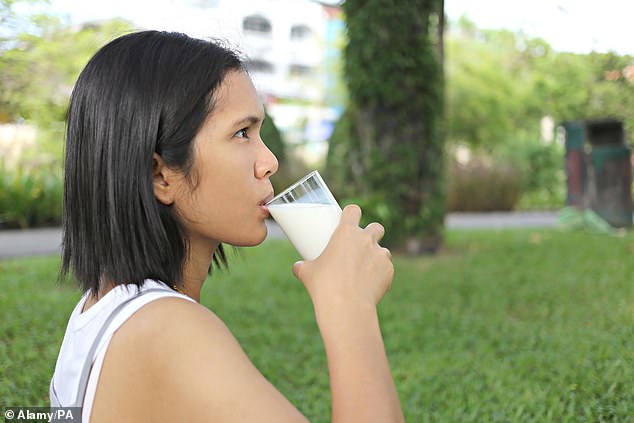It has long been known that milk is good for teeth and bones.
Now, experts have found that drinking a glass a day can also reduce the risk of bowel cancer by almost a fifth, according to a study of more than half a million women.
An extra 300 mg of calcium per day (about the amount contained in a large glass of milk) could be linked to a 17 percent decrease in the risk of bowel cancer, according to new research.
Scientists analyzed dietary data from more than 542,000 women to investigate the link between 97 products and nutrients and someone’s chances of developing bowel cancer.
The findings showed that calcium-rich foods and drinks, such as milk and yogurt, were linked to a lower risk of bowel cancer diagnosis over 16 years.
Calcium was found to have a similar effect in both dairy and non-dairy sources, suggesting it was the main factor responsible for reducing risk.
However, the team found that eating a lot of cheese or ice cream didn’t make a difference.
The findings, published in the journal Nature Communications, also reinforced the clear link between alcohol consumption and an increased risk of bowel cancer.
Calcium, a mineral in milk, was thought to be responsible for the reduced risk of bowel cancer in dairy consumers.
Drinking an extra 20 grams of alcohol per day, equivalent to a large glass of wine, was found to cause a 15 percent increase in risk across the entire cohort.
Red and processed meat were among other dietary foods associated with increased chances of bowel cancer, and 30 grams more per day was linked to an 8 percent increased risk.
According to analysis by Cancer Research UK, around 44,000 cases of bowel cancer occur each year, making it the fourth most common cancer in the UK.
More than half of all bowel cancer cases can be prevented.
Dr Keren Papier, lead researcher and senior nutritional epidemiologist at Oxford Population Health, said: “This is the most comprehensive study ever conducted on the relationship between diet and bowel cancer, and highlights the protective role of calcium in the development of this disease.” .
“More research is needed to understand the health impacts of increased calcium in different populations.”
The team said calcium’s protective role may come from its ability to bind to bile acids and free fatty acids in the colon, thereby reducing their potentially carcinogenic effects.
Sophia Lowes, senior director of health information at Cancer Research UK, which funded the study, said: “Bowel cancer is one of the most common cancers affecting people in the UK, which is why it is so vital that we know how to prevent it.”
‘Maintaining a healthy, balanced diet, as well as maintaining a healthy weight and stopping smoking, is one of the best ways to reduce the risk of bowel cancer.
‘This includes reducing alcohol and red and processed meats, and eating plenty of fruits, vegetables and whole grains.
‘Dairy products such as milk can also form part of a diet that reduces the risk of bowel cancer.
“We hope that more research is done, including the effects of specific ingredients such as calcium, to ensure that this devastating disease affects fewer people.”
Independent experts welcomed what they called a “well-conducted analysis” and added that it could have implications for many women.
Professor Andrew Prentice, nutrition expert at the London School of Hygiene and Tropical Medicine, said: “The results highlight that milk consumption is particularly beneficial and show evidence that this effect may be largely due to the calcium in milk. , which raises the question of whether calcium supplements may have a protective effect.
“There are no opinions on this, but as a nutritionist I will continue to take calcium from milk and dairy products, which are rich in so many nutrients.”
Professor Tom Sanders, a nutrition expert at King’s College London, said the results support previous research showing dairy products could protect against cancer, although the mechanism of exactly how it works is still unknown.
“One theory is that calcium can bind to free bile acids in the intestine, preventing the harmful effects of free bile acids on the intestinal mucosa,” he said.
However, Professor Ian Givens, a nutrition expert at the University of Reading, said the findings were worrying given data suggesting British women do not consume enough dairy, which in theory increases their risk of cancer.
“What is particularly worrying is that many women in the UK, especially younger age groups, are consuming less dairy and have calcium intakes below recommended levels,” she said.
“Combined with other large-scale research, these findings make a strong argument for maintaining adequate dairy consumption as part of a balanced diet.”


